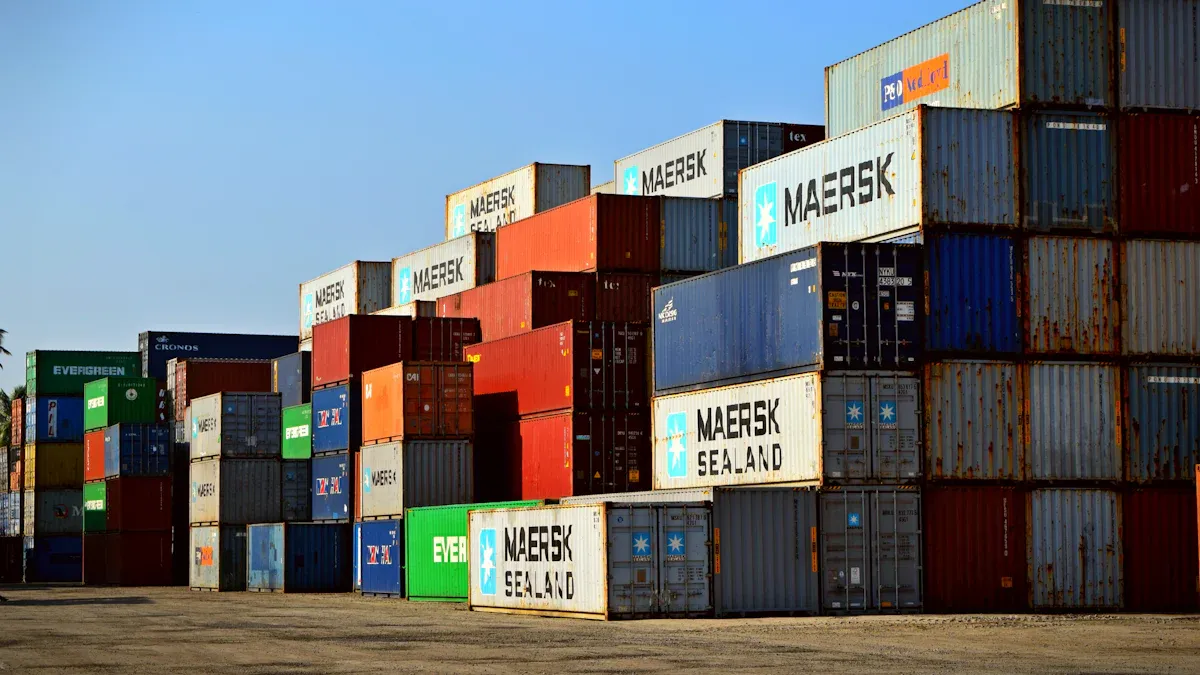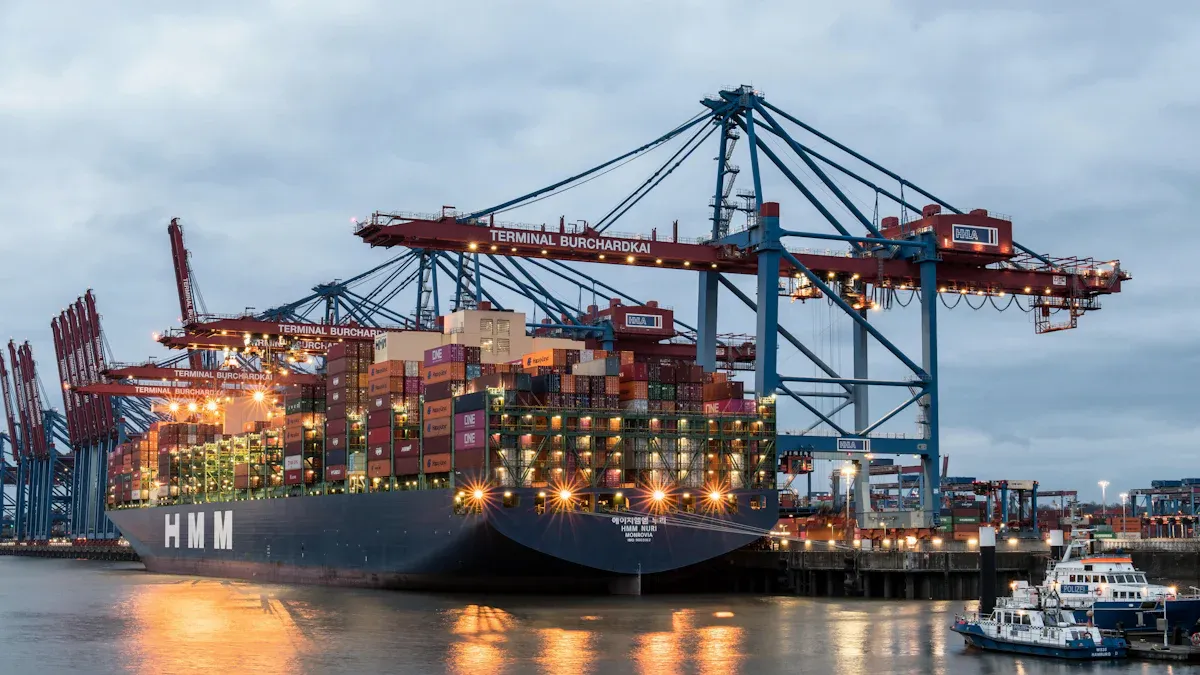Never Miss These Key Resources for Overseas Logistics

Overseas shipping needs important resources to work well. Digital tools check progress and track tasks carefully. ERP systems help organize work and save time. Sensors give real-time data for smarter choices. These resources lower costs and improve global trade. They help businesses stay ahead in the shipping world.
Key Takeaways
Use freight software to handle tasks, fix mistakes, and speed up deliveries. This helps provide quicker service and satisfied customers.
Set up tracking tools to watch shipments and avoid delays. These tools make things clearer and help with better choices in shipping.
Work with customs experts to follow rules and stay legal. Their knowledge saves time, cuts costs, and lowers risks in global shipping.
Essential Tools and Technologies for Overseas Logistics

Freight Management Software for Logistics Efficiency
Freight management software helps make logistics work better. It handles tasks like tracking shipments, managing documents, and checking freight costs. This reduces mistakes and saves time for important work. Using this software can improve routes, cut costs, and speed up deliveries. For example, a shipping company made deliveries 30% faster by using route-planning software.
This software does more than just automate tasks. It shows the supply chain clearly, letting you track shipments in real-time. This helps you communicate better with customers and makes them happier. It also lowers costs by finding problems and fixing workflows.
Here’s how freight management software helps logistics:
Benefit | Description |
|---|---|
Automated Processes | Cuts down on manual work, reducing errors and saving time. |
Increases Efficiency | Makes workflows smoother, leading to faster deliveries. |
Improves Customer Satisfaction | Better tracking tools mean quicker service and happier customers. |
Streamlines Route Optimization | Plans better routes to save fuel and time. |
Reduces Costs | Fixes problems and lowers costs, helping businesses grow. |
By 2026, most supply chain software will use AI and analytics. These tools will help you make smarter choices and improve logistics even more.
Real-Time Tracking Systems for Cross Border Logistics
Real-time tracking systems are key for international shipping. They give live updates on shipments, so you can see where they are and fix delays quickly. For instance, a delivery company cut transit times by 20% with fleet tracking. Another company reduced its carbon footprint by 30% using GPS-based routing.
These systems also improve driver safety and shipment reliability. Monitoring tools have made drivers 22% safer, and global delivery times are now 15% faster. They also prevent 35% of cross-border delays, making operations smoother.
Improvement Area | Statistic |
|---|---|
Reduction in shipment delays | 35% fewer cross-border delays |
Average delivery time reduction | 15% faster deliveries worldwide |
Improvement in driver safety | 22% safer driving through monitoring |
Adding real-time tracking to your logistics boosts efficiency and trust. These systems improve transparency and help you make better decisions for your supply chain.
Customs Documentation Tools for Seamless Trade
Handling customs can be tricky in global shipping. Customs documentation tools make it easier by automating forms, tracking documents, and following rules. These tools help avoid fines and delays, making shipping smoother.
For example, automating customs forms speeds up managing broker data. Tracking documents reduces mistakes and fines. Sharing features let you send files easily to brokers, forwarders, and customs officials.
Feature | Description |
|---|---|
Automation of Customs Filings | Speeds up managing customs forms using data from ERP or suppliers. |
Document Tracking | Tracks needed documents, reducing errors and fines. |
Collaboration | Makes sharing files with brokers and customs officials simple. |
These tools also help follow rules and avoid risks from changing regulations. For example, a company saved millions by using software to classify tariffs correctly. Customs tools are vital for smooth trade and cutting costs in global shipping.
Building Strategic Partnerships in the Logistics Business
Strategic partnerships are important for the logistics industry. Working with good partners makes operations easier, lowers costs, and boosts efficiency. Freight forwarders, customs brokers, and local providers help handle cross-border logistics challenges.
Working with Freight Forwarders and Shipping Agents
Freight forwarders and shipping agents make international shipping simpler. They organize shipments, manage paperwork, and ensure goods move smoothly. Their skills help avoid delays and speed up deliveries.
Why freight forwarder partnerships are valuable:
FIATA supports digital transport documents for better efficiency.
FIATA surveys show freight forwarders face challenges, needing teamwork.
The eFBL by FIATA is a great example of smooth shipping.
Freight forwarders offer networks and knowledge to improve logistics. They plan better routes, cut costs, and make customers happier. These partnerships help grow your logistics business worldwide.
Customs Brokers’ Role in Cross-Border Logistics
Customs brokers are key for international shipping. They handle rules, ensure compliance, and reduce risks. Their knowledge of tariffs and customs saves time and avoids mistakes.
Benefit | Description |
|---|---|
Brokers follow changing laws to avoid costly errors. | |
HS classification expertise | Correct codes prevent fines and save money on tariffs. |
Reducing delays | Brokers speed up customs clearance with proper paperwork. |
Cutting costs | They find savings through accurate duty calculations and trade deals. |
Lowering risks | Brokers fix compliance issues to keep shipments moving. |
Handling special goods | They know how to manage sensitive or regulated items. |
Customs brokers build strong ties with officials to speed up clearance. Their advice keeps shipments moving, cutting delays and improving logistics.
Teaming Up with Local Logistics Providers
Local logistics providers offer helpful regional knowledge. They know local rules, transport systems, and customer needs. Their skills ensure fast deliveries and affordable solutions.
Why local logistics expertise matters:
On-Time Delivery Rate (OTD): Shows how often shipments arrive on time.
Freight Cost per Shipment: Tracks average shipping costs to control spending.
Tracking Benefits: Helps find problems, lower costs, and improve service.
Local providers give insights into regional markets and improve logistics. Their knowledge helps solve local issues, ensuring smooth operations and happy customers.
Strategies to Improve Overseas Logistics Operations
Managing Risks and Planning for Problems
Handling risks is very important in global shipping. You can get ready for surprises by making a backup plan. This plan should cover problems like delays, bad weather, or broken equipment. Collecting accurate data, like using simple tests, helps find weak spots. These tools show where to improve and lower risks.
Tip: Update your backup plan often. This keeps it ready for new problems.
Companies using these tests have cut risks and worked better. By studying data and using these ideas, you can improve shipping. This ensures smooth delivery of items that spoil quickly.
Better Routes with JUSDA's JusLink
Planning good routes is key for shipping fresh goods. JUSDA's JusLink uses smart tools and live data to plan better routes. This saves money and speeds up deliveries.
Key Benefits | What It Does |
|---|---|
Better Route Planning | |
Smart Learning | Makes routes shorter and deliveries faster. |
Quick Changes | Adjusts routes fast using live updates for better results. |
GPS and tracking tools make work even smoother. They show where vehicles are and help change delivery times. This ensures safe and on-time shipping. Better routes also save fuel, making shipping eco-friendly.
Following Trade Rules for Smooth Shipping
Following trade rules is crucial for cold storage shipping. Knowing global laws helps avoid fines and delays. Methods like checking risky areas and reviewing controls keep you within the law.
Method | Why It Helps |
|---|---|
Keeps you informed about trade laws. | |
Keeping Records | Ensures all documents are correct and ready. |
Checking Risky Areas | Focuses on problem spots to improve compliance. |
Reviewing Internal Controls | Checks if your compliance steps are working well. |
Staff Training | Teaches workers about rules and best practices. |
Using digital tools and blockchain makes customs easier. These tools speed up checks and improve safety. For example, VAT systems help manage costs while following rules. By focusing on laws, you build trust and ensure smooth global shipping.

JUSDA Solutions
To provide you with professional solutions and quotations.
Using the right tools keeps logistics running well. Tools like smart data and automation help improve work. JUSDA and JUSDASR give you confidence to start logistics projects. Check your system, find problems, and grow by improving supply chain plans.
See Also
Top Reasons To Join These Essential Logistics Webinars
Unveiling The Comprehensive Guide To Global Logistics Firms
Unlocking Logistics Savings: Expert Tips For Supply Chain Success
